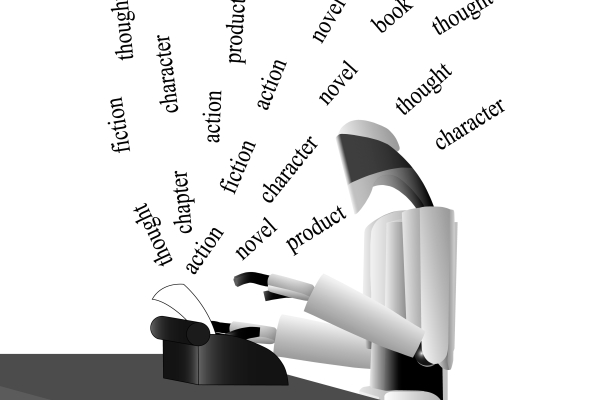
DIS conference paper from UBC shows what writers want (or don’t want) from AI
Writing tools over the millennia have facilitated the transmission of information and knowledge using countless types of mediums. Etchings on rocks. Pictographs on tablets. Pen and parchment. Morse code. Typewriters. Word processors.
But there has always been one key driver present in each and every one of those mediums: the infinitely creative human brain.
Since advanced AI writing tools emerged on the scene, the brain factor seems to be less necessary. And as a result, the tech industry and writers themselves have been trying to figure out if AI writing tools are a good thing. Or not.
Is it possible for AI tools to match what professional human writers can do on their own? Do storytellers even want that?
This dilemma is exactly what UBC computer science members, Master’s student Oloff C. Biermann, Postdoctoral fellow Ning F. Ma, and Assistant Professor Dr. Dongwook Yoon decided to explore in their qualitative study. The resulting paper earned them an Honourable Mention award at the Designing Interactive Systems (DIS) 2022 Conference:
So what DO writers want from AI?
The team explored the topic of what writers actually want from AI tools. “We learned about their personal values and motivation for writing,” said Oloff Biermann. “Also, the reason why they write really influences the degree to which they want AI to assist them.”
The researchers spoke with hobbyist writers and professional writers, both of whom have somewhat different needs. They discovered that hobbyist writers are more heavily influenced by the emotional value they get from writing.

“They [the hobbyists] don't really want AI to take over their writing,” Oloff said. “They mostly want AI tools to act only like an assistant for them. But the professional writers who want to be productive in their writing, they welcome AI to do the writing for them in order to help them make more money.”

To add context, Dr. Yoon added, “This study is about values: especially human value when working with AI. It’s not about being replaced by AI. When we consider if AI can write better and more productively than humans, it’s scary to envision what that would look like. But if you look at other historical inventions, like the invention of the steam engine and how it has changed the nature of physical labour. Or how computers totally changed what it means to be an accountant in the 80s. These jobs have kept going but in a different nature.”
The study found that hobbyist writers are less willing to give up their control to AI. They appreciate ownership over their storytelling, because it provides a feeling of integrity and enjoyment. But considering writing has many different nuances and stages, would these writers be willing to hand over some parts of the process to AI in order to be more productive?
In terms of the writing process, the researchers considered AI support for three well-known writing stages (as identified by Flower and Hayes in A Cognitive Process Theory of Writing):
1. Planning/ideation (what you are going to write)
2. Translation (putting ideas into words)
3. Revision (editing)
“We found that none of the writers wanted to give away the task of ideation because that means they’re not bringing a part of themselves as a writer,” Dr. Yoon explained.
Using AI for some parts, not all parts, of storytelling
With the translation stage, AI is very capable of translating (writing) text from ideas, but hobbyist writers actually desire to retain the ‘labour of love’ involved in writing. Whether it’s experiencing the torturous writer’s block, or pulling their hair out at 2 a.m. in a struggle to find the right words, they don’t want to miss this elemental part of the process because it allows them to maintain their integrity.
However, several professional writers in the study indicated they too, would still like to do the planning stage themselves, but would be happy to hand the translation stage over to AI for more prolific writing.
Adaptable program design is critical
“These results tell us that when designing AI tools for writers, it’s not just about designing for maximum productivity. It’s not as simple as that,” Oloff explained. “Designers need to ensure there is room for adaptation to the personal values that writers hold, not just productivity.
Oloff admitted his personal bias was that he thought writers would want productivity above all else. “The most surprising thing about the results is that, even in the case of some of the professional writers, they seem very resistant to AI-induced productivity across the board.”
The team also discovered that even the professional writers they interviewed want to remain in control by at least taking the role of editor. Similar to the role of a publication editor, they want the final say on the end product. Oloff added “They [professional writers] actually assign a lot of emotional value to their vocation because they care about maintaining integrity.”
Dr. Yoon added, “As indicated by this study, it tells us AI should ideally behave like a considerate human colleague, and similar to when a writer works with a ghost writer or a writing assistant. Those individuals adjust to the writer’s needs and honour their value as the primary author. So it’s almost like an anthropomorphic relationship, where the role of AI is adaptable and can personally adjust to the needs of the writer.”
More about Oloff Biermann
More about Ning F. Ma
More about Dongwook Yoon